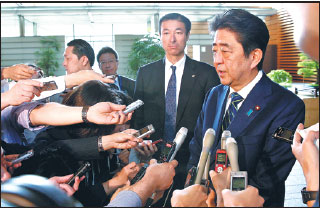Abe stung by poll setback in Tokyo
(China Daily) Updated: 2017-07-04 07:25|
Japan's Prime Minister Shinzo Abe speaks to reporters as he arrives at his office in Tokyo on Monday.Kim Kyunghoon/ Reuters |
He seeks to regain public's trust after historic defeat of ruling party
TOKYO - Japanese Prime Minister Shinzo Abe said on Monday he will work to regain public trust after his party suffered a historic defeat in an election in the nation's capital, signaling trouble ahead for him amid tumbling support rates.
The dismal showing for Abe's Liberal Democratic Party in Sunday's Tokyo Metropolitan assembly election was a stinging rebuke for his 4-1/2-year-old administration, although on the surface it was a referendum on popular Governor Yuriko Koike's year in office.
Koike's novice Tokyo Citizens First party and its allies, including the LDP's national-level coalition partner, the Komeito, took 79 seats in the 127-member chamber.
The LDP won only 23 seats, its lowest in history in the election, according to local media.
"I want to regain the people's trust by unifying the party and... showing results," Abe said.
"It was a severe judgment suggesting (voters) thought the Abe administration was getting slack," Abe said. "We must accept this firmly and seriously and make every effort to return to our original aspirations of when we regained power."
Past Tokyo elections have been bellwethers for national trends. A 2009 Tokyo poll in which the LDP won just 38 seats was followed by its defeat in a general election that year, although this time no lower house poll need be held until late next year.
Scandal over suspicions
Koike, a media-savvy ex-defense minister and former LDP member, took office a year ago as the first female governor in the capital, defying the local LDP chapter to run and promising to reform governance of a megacity with a population of 13.7 million and an economy bigger than the Netherlands'.
The LDP has been hit by a scandal over suspicions - denied by the government - that Abe helped a friend's business get favored treatment.
It has also been hurt by ministerial gaffes, and by a perception among many voters that Abe's administration has grown arrogant after more than four years in power.
The huge victory for Koike's party and its allies has sparked fresh speculation that she will take her party national, but any bid by Koike herself for the country's top job looks unlikely until after the Tokyo 2020 Olympics - if her popularity remains high and her party proves it is able to govern.
"This was less a vote for 'Tom in First' (Tokyo Citizens First) than a repudiation of Abe," said Jeffrey Kingston, director of Asia studies at Temple University's Japan campus. "It was not a grass roots firestorm."
Abe's support rate, which tumbled in surveys last month, slipped again to 38 percent from 41 percent in an Asahi newspaper poll conducted at the weekend. That was lower than the 42 percent who did not back his cabinet.
Abe will likely reshuffle his cabinet to try to repair his battered image, although the tactic has backfired in the past when new ministers became involved in scandals or committed gaffes.
"The good scenario for the economy and markets is that the Tokyo Assembly election result triggers a pro-reform cabinet reshuffle, and returns focus to economic issues," said economist Robert Feldman.
"The bad scenario is the LDP becomes paralyzed, and few reform actions are taken," he said.
Reuters - Xinhua - Afp
- 'Cooperation is complementary'
- Worldwide manhunt nets 50th fugitive
- China-Japan meet seeks cooperation
- Agency ensuring natural gas supply
- Global manhunt sees China catch its 50th fugitive
- Call for 'Red Boat Spirit' a noble goal, official says
- China 'open to world' of foreign talent
- Free trade studies agreed on as Li meets with Canadian PM Trudeau
- Emojis on austerity rules from top anti-graft authority go viral
- Xi: All aboard internet express












